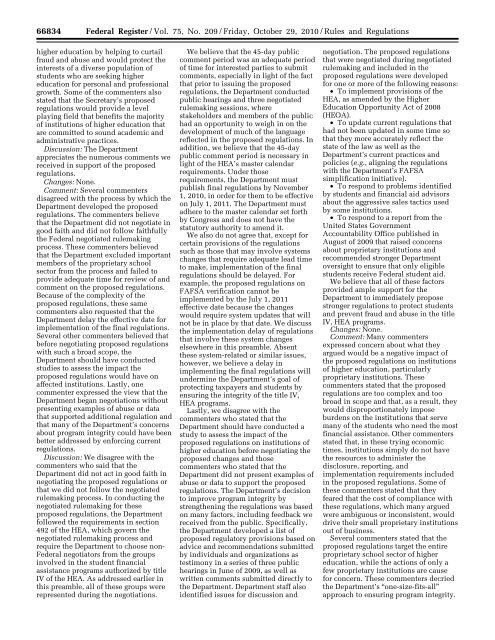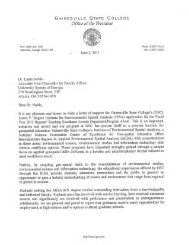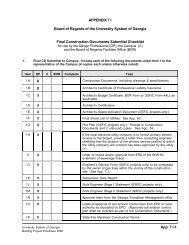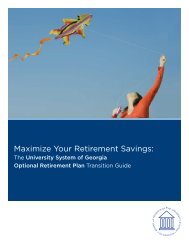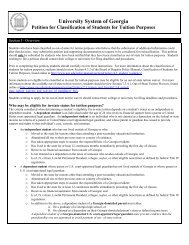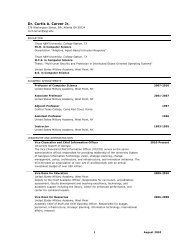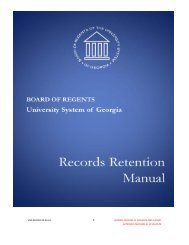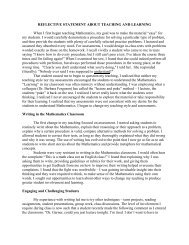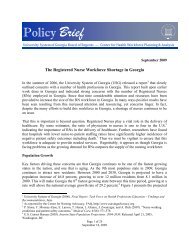Office of Postsecondary Education - U.S. Department of Education
Office of Postsecondary Education - U.S. Department of Education
Office of Postsecondary Education - U.S. Department of Education
You also want an ePaper? Increase the reach of your titles
YUMPU automatically turns print PDFs into web optimized ePapers that Google loves.
WReier-Aviles on DSKGBLS3C1PROD with RULES266834 Federal Register / Vol. 75, No. 209 / Friday, October 29, 2010 / Rules and Regulationshigher education by helping to curtailfraud and abuse and would protect theinterests <strong>of</strong> a diverse population <strong>of</strong>students who are seeking highereducation for personal and pr<strong>of</strong>essionalgrowth. Some <strong>of</strong> the commenters alsostated that the Secretary’s proposedregulations would provide a levelplaying field that benefits the majority<strong>of</strong> institutions <strong>of</strong> higher education thatare committed to sound academic andadministrative practices.Discussion: The <strong>Department</strong>appreciates the numerous comments wereceived in support <strong>of</strong> the proposedregulations.Changes: None.Comment: Several commentersdisagreed with the process by which the<strong>Department</strong> developed the proposedregulations. The commenters believethat the <strong>Department</strong> did not negotiate ingood faith and did not follow faithfullythe Federal negotiated rulemakingprocess. These commenters believedthat the <strong>Department</strong> excluded importantmembers <strong>of</strong> the proprietary schoolsector from the process and failed toprovide adequate time for review <strong>of</strong> andcomment on the proposed regulations.Because <strong>of</strong> the complexity <strong>of</strong> theproposed regulations, these samecommenters also requested that the<strong>Department</strong> delay the effective date forimplementation <strong>of</strong> the final regulations.Several other commenters believed thatbefore negotiating proposed regulationswith such a broad scope, the<strong>Department</strong> should have conductedstudies to assess the impact theproposed regulations would have onaffected institutions. Lastly, onecommenter expressed the view that the<strong>Department</strong> began negotiations withoutpresenting examples <strong>of</strong> abuse or datathat supported additional regulation andthat many <strong>of</strong> the <strong>Department</strong>’s concernsabout program integrity could have beenbetter addressed by enforcing currentregulations.Discussion: We disagree with thecommenters who said that the<strong>Department</strong> did not act in good faith innegotiating the proposed regulations orthat we did not follow the negotiatedrulemaking process. In conducting thenegotiated rulemaking for theseproposed regulations, the <strong>Department</strong>followed the requirements in section492 <strong>of</strong> the HEA, which govern thenegotiated rulemaking process andrequire the <strong>Department</strong> to choose non-Federal negotiators from the groupsinvolved in the student financialassistance programs authorized by titleIV <strong>of</strong> the HEA. As addressed earlier inthis preamble, all <strong>of</strong> these groups wererepresented during the negotiations.We believe that the 45-day publiccomment period was an adequate period<strong>of</strong> time for interested parties to submitcomments, especially in light <strong>of</strong> the factthat prior to issuing the proposedregulations, the <strong>Department</strong> conductedpublic hearings and three negotiatedrulemaking sessions, wherestakeholders and members <strong>of</strong> the publichad an opportunity to weigh in on thedevelopment <strong>of</strong> much <strong>of</strong> the languagereflected in the proposed regulations. Inaddition, we believe that the 45-daypublic comment period is necessary inlight <strong>of</strong> the HEA’s master calendarrequirements. Under thoserequirements, the <strong>Department</strong> mustpublish final regulations by November1, 2010, in order for them to be effectiveon July 1, 2011. The <strong>Department</strong> mustadhere to the master calendar set forthby Congress and does not have thestatutory authority to amend it.We also do not agree that, except forcertain provisions <strong>of</strong> the regulationssuch as those that may involve systemschanges that require adequate lead timeto make, implementation <strong>of</strong> the finalregulations should be delayed. Forexample, the proposed regulations onFAFSA verification cannot beimplemented by the July 1, 2011effective date because the changeswould require system updates that willnot be in place by that date. We discussthe implementation delay <strong>of</strong> regulationsthat involve these system changeselsewhere in this preamble. Absentthese system-related or similar issues,however, we believe a delay inimplementing the final regulations willundermine the <strong>Department</strong>’s goal <strong>of</strong>protecting taxpayers and students byensuring the integrity <strong>of</strong> the title IV,HEA programs.Lastly, we disagree with thecommenters who stated that the<strong>Department</strong> should have conducted astudy to assess the impact <strong>of</strong> theproposed regulations on institutions <strong>of</strong>higher education before negotiating theproposed changes and thosecommenters who stated that the<strong>Department</strong> did not present examples <strong>of</strong>abuse or data to support the proposedregulations. The <strong>Department</strong>’s decisionto improve program integrity bystrengthening the regulations was basedon many factors, including feedback wereceived from the public. Specifically,the <strong>Department</strong> developed a list <strong>of</strong>proposed regulatory provisions based onadvice and recommendations submittedby individuals and organizations astestimony in a series <strong>of</strong> three publichearings in June <strong>of</strong> 2009, as well aswritten comments submitted directly tothe <strong>Department</strong>. <strong>Department</strong> staff alsoidentified issues for discussion andVerDate Mar2010 14:10 Oct 28, 2010 Jkt 223001 PO 00000 Frm 00004 Fmt 4701 Sfmt 4700 E:\FR\FM\29OCR2.SGM 29OCR2negotiation. The proposed regulationsthat were negotiated during negotiatedrulemaking and included in theproposed regulations were developedfor one or more <strong>of</strong> the following reasons:• To implement provisions <strong>of</strong> theHEA, as amended by the Higher<strong>Education</strong> Opportunity Act <strong>of</strong> 2008(HEOA).• To update current regulations thathad not been updated in some time sothat they more accurately reflect thestate <strong>of</strong> the law as well as the<strong>Department</strong>’s current practices andpolicies (e.g., aligning the regulationswith the <strong>Department</strong>’s FAFSAsimplification initiative).• To respond to problems identifiedby students and financial aid advisorsabout the aggressive sales tactics usedby some institutions.• To respond to a report from theUnited States GovernmentAccountability <strong>Office</strong> published inAugust <strong>of</strong> 2009 that raised concernsabout proprietary institutions andrecommended stronger <strong>Department</strong>oversight to ensure that only eligiblestudents receive Federal student aid.We believe that all <strong>of</strong> these factorsprovided ample support for the<strong>Department</strong> to immediately proposestronger regulations to protect studentsand prevent fraud and abuse in the titleIV, HEA programs.Changes: None.Comment: Many commentersexpressed concern about what theyargued would be a negative impact <strong>of</strong>the proposed regulations on institutions<strong>of</strong> higher education, particularlyproprietary institutions. Thesecommenters stated that the proposedregulations are too complex and toobroad in scope and that, as a result, theywould disproportionately imposeburdens on the institutions that servemany <strong>of</strong> the students who need the mostfinancial assistance. Other commentersstated that, in these trying economictimes, institutions simply do not havethe resources to administer thedisclosure, reporting, andimplementation requirements includedin the proposed regulations. Some <strong>of</strong>these commenters stated that theyfeared that the cost <strong>of</strong> compliance withthese regulations, which many arguedwere ambiguous or inconsistent, woulddrive their small proprietary institutionsout <strong>of</strong> business.Several commenters stated that theproposed regulations target the entireproprietary school sector <strong>of</strong> highereducation, while the actions <strong>of</strong> only afew proprietary institutions are causefor concern. These commenters decriedthe <strong>Department</strong>’s ‘‘one-size-fits-all’’approach to ensuring program integrity.


